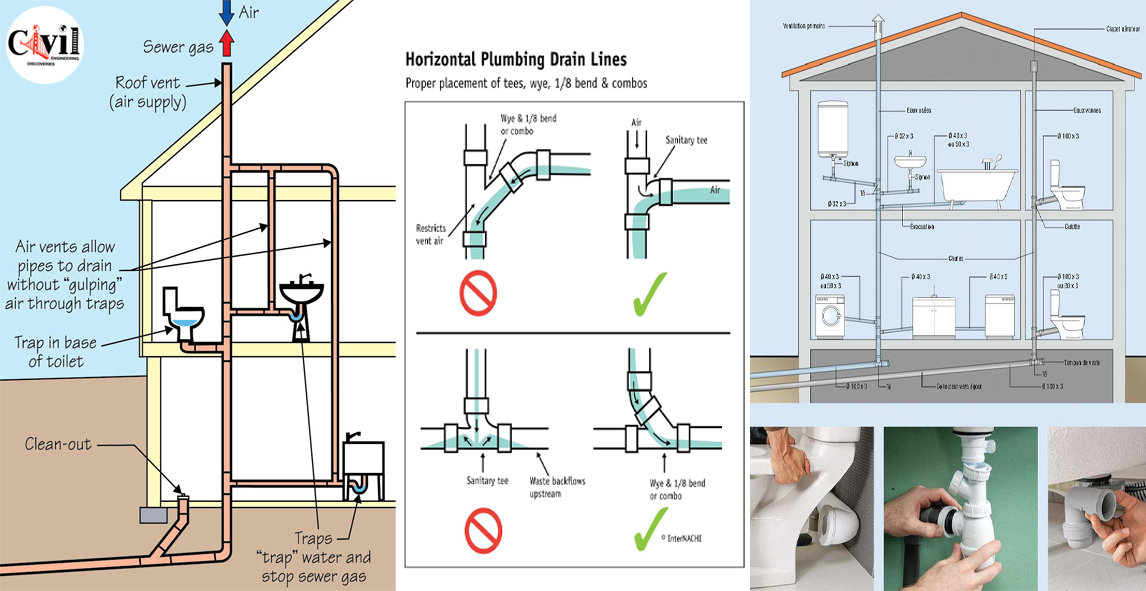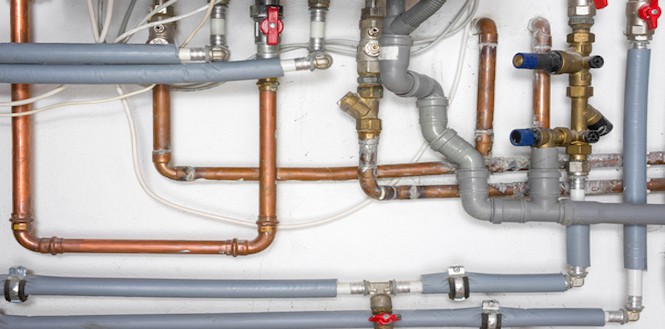Understanding Your Home's Plumbing System Anatomy
Understanding Your Home's Plumbing System Anatomy
Blog Article
What are your opinions regarding Understanding Your Home's Plumbing Anatomy?

Understanding just how your home's pipes system works is crucial for every single home owner. From supplying tidy water for alcohol consumption, food preparation, and showering to securely removing wastewater, a well-maintained pipes system is critical for your family's wellness and convenience. In this thorough guide, we'll explore the intricate network that composes your home's pipes and deal ideas on maintenance, upgrades, and dealing with common concerns.
Intro
Your home's pipes system is more than just a network of pipelines; it's an intricate system that guarantees you have access to clean water and reliable wastewater elimination. Understanding its components and how they interact can aid you stop costly repairs and make certain whatever runs smoothly.
Standard Parts of a Pipes System
Pipes and Tubes
At the heart of your plumbing system are the pipelines and tubing that lug water throughout your home. These can be made from various products such as copper, PVC, or PEX, each with its advantages in regards to resilience and cost-effectiveness.
Components: Sinks, Toilets, Showers, etc.
Components like sinks, toilets, showers, and tubs are where water is used in your home. Recognizing exactly how these fixtures link to the plumbing system aids in identifying problems and intending upgrades.
Valves and Shut-off Factors
Shutoffs manage the circulation of water in your plumbing system. Shut-off valves are critical during emergency situations or when you require to make repair work, permitting you to isolate parts of the system without disrupting water circulation to the whole home.
Supply Of Water System
Key Water Line
The primary water line attaches your home to the local water supply or an exclusive well. It's where water enters your home and is distributed to numerous fixtures.
Water Meter and Stress Regulator
The water meter steps your water use, while a pressure regulatory authority makes sure that water flows at a secure stress throughout your home's plumbing system, protecting against damage to pipelines and fixtures.
Cold Water vs. Warm water Lines
Understanding the distinction in between cold water lines, which supply water straight from the main, and hot water lines, which lug heated water from the hot water heater, helps in fixing and preparing for upgrades.
Drainage System
Drain Pipes Pipes and Traps
Drain pipes carry wastewater far from sinks, showers, and bathrooms to the sewage system or sewage-disposal tank. Traps stop sewer gases from entering your home and additionally trap debris that can cause blockages.
Air flow Pipelines
Ventilation pipelines permit air into the water drainage system, avoiding suction that might reduce drainage and trigger catches to vacant. Proper ventilation is vital for keeping the integrity of your plumbing system.
Value of Proper Drain
Making certain proper drainage stops backups and water damage. On a regular basis cleansing drains and maintaining traps can stop pricey fixings and extend the life of your pipes system.
Water Furnace
Types of Water Heaters
Water heaters can be tankless or standard tank-style. Tankless heating systems warmth water as needed, while containers save warmed water for instant use.
Upgrading Your Plumbing System
Factors for Updating
Updating to water-efficient components or replacing old pipelines can boost water top quality, reduce water bills, and increase the value of your home.
Modern Plumbing Technologies and Their Benefits
Explore technologies like smart leak detectors, water-saving toilets, and energy-efficient water heaters that can save money and decrease environmental impact.
Cost Considerations and ROI
Calculate the upfront costs versus long-term savings when considering pipes upgrades. Several upgrades pay for themselves with minimized energy costs and less fixings.
How Water Heaters Connect to the Plumbing System
Understanding exactly how water heaters link to both the cold water supply and hot water circulation lines assists in identifying concerns like not enough warm water or leakages.
Upkeep Tips for Water Heaters
Frequently purging your water heater to remove sediment, examining the temperature level settings, and examining for leaks can expand its life-span and enhance energy efficiency.
Usual Pipes Issues
Leaks and Their Reasons
Leaks can occur as a result of maturing pipes, loose installations, or high water stress. Dealing with leakages without delay stops water damage and mold and mildew development.
Clogs and Blockages
Obstructions in drains and toilets are usually triggered by flushing non-flushable things or an accumulation of grease and hair. Making use of drain screens and bearing in mind what goes down your drains can prevent obstructions.
Indications of Pipes Issues to Watch For
Low tide pressure, slow-moving drains, foul odors, or unusually high water costs are signs of possible plumbing troubles that need to be attended to promptly.
Pipes Maintenance Tips
Normal Evaluations and Checks
Set up annual pipes evaluations to capture problems early. Seek indicators of leaks, deterioration, or mineral accumulation in taps and showerheads.
DIY Upkeep Tasks
Easy jobs like cleaning tap aerators, checking for bathroom leakages using color tablets, or protecting exposed pipes in cool climates can avoid significant plumbing problems.
When to Call a Specialist Plumbing
Know when a pipes issue needs specialist experience. Attempting intricate repairs without appropriate expertise can lead to more damages and higher repair work expenses.
Tips for Minimizing Water Use
Straightforward practices like taking care of leakages promptly, taking shorter showers, and running complete lots of washing and dishes can conserve water and lower your utility bills.
Eco-Friendly Plumbing Options
Think about sustainable plumbing products like bamboo for flooring, which is durable and environmentally friendly, or recycled glass for kitchen counters.
Emergency situation Preparedness
Steps to Take During a Pipes Emergency situation
Know where your shut-off shutoffs lie and just how to switch off the water system in case of a ruptured pipeline or significant leak.
Significance of Having Emergency Get In Touches With Convenient
Keep contact info for regional plumbing technicians or emergency situation solutions conveniently available for quick feedback throughout a pipes dilemma.
Ecological Effect and Conservation
Water-Saving Fixtures and Appliances
Mounting low-flow taps, showerheads, and toilets can considerably decrease water usage without compromising performance.
DIY Emergency Fixes (When Appropriate).
Momentary fixes like using duct tape to spot a dripping pipeline or positioning a pail under a trickling tap can decrease damages up until an expert plumbing technician shows up.
Final thought.
Comprehending the composition of your home's plumbing system empowers you to maintain it properly, saving time and money on fixings. By complying with routine upkeep regimens and staying informed concerning modern-day pipes modern technologies, you can guarantee your pipes system operates efficiently for many years to find.
Understanding Your Home Plumbing System: A Comprehensive Guide
Plumbing System: The Lifeline of Your Home
At its core, the plumbing system is designed to perform two primary functions: bring fresh water into your home and remove wastewater. The system is a network of pipes, fixtures, and other components that transport water and sewage. Residential plumbing systems include potable water supply lines, drain-waste-vent (DWV) systems, and various plumbing fixtures that make water use in daily tasks possible.
Key Components:
Water Supply: This part of your plumbing system brings municipal water into your home, passing through the main water supply line. It s responsible for supplying all water needs, from drinking to bathing.
Drainage System: It carries waste and water away from your home to the sewer or septic system. This system includes all the piping within your home that leads to external sewage or septic systems.
Vent System: An essential yet often overlooked component, the vent system allows sewer gases to escape and lets air into the drainpipes, ensuring water and waste move correctly through the system.
Fixture: More Than Just Taps and Toilets
Plumbing fixtures are the most interactive parts of the plumbing system, including faucets, showers, toilets, and sinks. Each fixture is connected to the plumbing system and plays a role in either the delivery of freshwater or the disposal of waste and wastewater.
Types of Fixtures:
Faucets and Sinks: Used for washing hands, dishes, and other daily water needs. Toilets: Dispose of human waste through the sewage system. Bathtubs and Showers: Provide bathing facilities, requiring both hot and cold water supply. Water Supply: The Source of Life
The water supply system is a critical component, ensuring that potable water is available throughout your home for various uses, including drinking, cooking, and cleaning. This system consists of pipes that distribute water to different parts of the house, controlled by valves to regulate the water flow.
Types of Plumbing: Materials and Methods
Various types of plumbing systems and materials are used in residential settings, each with its advantages and applications. From copper and PVC pipes for water supply to cast iron and ABS for drainage, the choice of materials can impact the longevity and efficiency of your plumbing system.
https://intownplumbingtx.com/articles/home-plumbing-system-guide/

I'm just very eager about and I hope you appreciated our article. Are you aware of someone else who is serious about the subject? Please feel free to share it. We truly appreciate your readership.
Book Your Appointment Report this page